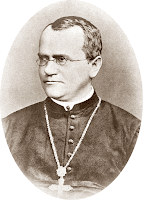
This is not the setting in which most books place Mendel. Almost invariably, they put him in the abbey's seemingly idyllic garden in which Mendel grew his now famous pea plants -- leading to his scientific discovery of the basic patterns of inheritance. Placing him in that idyllic garden cultivates a contrast between science and stereotyped religion, especially given our modern myth that science and religion have usually been in conflict. I still remember my own surprise in middle school upon reading in my biology textbook that a "monk" made one of the pivotal discoveries of modern science.

More precisely, the religious order Mendel was part of was a Roman Catholic order of friars (the Augustinian order). That classification meant that its members were more integrated into the surrounding secular community, primarily as teachers, even though in this case living in an abbey. And the friars of the Abbey of St. Thomas were especially engaged. The Abbey had a 30,000 volume library with books on botany, horticulture, agriculture, physics, and, of course, theology. Among Gregor's friar-colleagues were a musical maestro, a Goethe scholar, and a noted philosopher. The head abbot, Cyrill Franz Napp, was current on the latest scientific discoveries. It was in this abbey setting -- more conducive to enlightenment than being surrounded by occupying troops -- that "Mendel found a supportive scientific community," as the contemporary biographer Simon Mawer puts it.
Gregor Mendel was fond of logging statistics on many things, not just his famous pea-plant hybrids. He also kept data on the weather and astronomy. His being educated in probability and combinational mathematics doubtlessly encouraged his applying those types of skills to the study of plants. The data led him to discovery.
 Despite the temporary distraction of an occupying army, Mendel's now famous scientific paper on plant hybridization was published that same year of 1866. It was the culmination of eight years of work, hand-pollinating and logging seven pairs of traits in 28,000 pea plants, their 40,000 flowers, and nearly 400,000 seeds.
Despite the temporary distraction of an occupying army, Mendel's now famous scientific paper on plant hybridization was published that same year of 1866. It was the culmination of eight years of work, hand-pollinating and logging seven pairs of traits in 28,000 pea plants, their 40,000 flowers, and nearly 400,000 seeds.May we in our own small ways show determination in wanting to observe and appreciate the world of Nature, even when human conflict and chaos might dishearten us.
~ ~ ~
Have there been friends who have been part of your learning or your appreciating more the world of Nature?
(The quotation by Simon Mawer is taken from
Gregor Mendel: Planting the Seeds of Genetics, © 2006. p. 30.)
(The drawing of pea plants, Pisum sativum, is from the book Flora von Deutschland, Österreich und der Schweiz, 1885,
by Prof. Dr. Otto Wilhelm Thomé, and is used under a Creative Commons Attribution-Share Alike 3.0 Unported license.)
(The drawing of pea plants, Pisum sativum, is from the book Flora von Deutschland, Österreich und der Schweiz, 1885,
by Prof. Dr. Otto Wilhelm Thomé, and is used under a Creative Commons Attribution-Share Alike 3.0 Unported license.)

